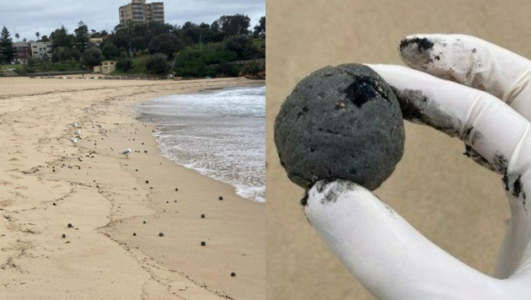Beachgoers Beware The Mysterious Black Spheres Found at Coogee Beach That Shut It Down Instantly!
By
- Replies 2
As Australians, we cherish our beautiful coastlines and the pristine beaches that dot our shores. They are natural wonders and central to our lifestyle and leisure. So, when something unexpected occurs, it's a cause for concern and immediate action. This was precisely the case at Coogee Beach in Sydney's east, which was recently closed to the public following a rather unusual and concerning discovery.
On a seemingly ordinary Tuesday afternoon, Coogee Beach's tranquillity was disrupted when council lifeguards stumbled upon an array of mysterious, black, ball-shaped debris scattered along the length of the beach. The discovery prompted Randwick Council to issue a warning, urging beachgoers to steer clear of the area 'until further notice.'
The peculiar spheres, which have since been identified as 'tar balls,' are a known environmental hazard. Tar balls are formed when crude oil or similar substances mix with ocean debris and water, often due to oil spills or natural seepage from the ocean floor. These sticky conglomerates can threaten wildlife, the environment, and potentially human health.
Randwick City Council environmental officers wasted no time collecting samples for testing and reported the incident to the Environmental Protection Agency (EPA) and Beachwatch NSW. The council's proactive approach highlights the importance of swift action in the face of potential environmental crises.
Randwick City Council Mayor Dylan Parker spoke to the media, detailing the extensive efforts by council crews who worked tirelessly through Tuesday night and into Wednesday morning, meticulously combing the beach for the black spheres. Mayor Parker emphasised the collaboration with the NSW Environmental Protection Agency and occupational hygienists to ensure that the beach is thoroughly cleaned and safe for the public once again.
According to Mayor Parker, the appearance of these tar balls at Coogee Beach is not just unusual but 'quite bizarre. ' While the suspicion is that they originated from an oil spill or seepage, investigations are ongoing to determine the exact cause of this environmental anomaly.
In the meantime, the beach remains closed as a precautionary measure, and the public is advised against touching or picking up tar balls. The safety of beachgoers and the preservation of the marine environment are of the utmost priority.
Interestingly, this incident seems to be isolated to Coogee Beach, as Mayor Parker has confirmed that other nearby beaches have been inspected and found to be clear of black debris.
This event serves as a stark reminder of the fragility of our natural ecosystems and the need for vigilance in protecting them. It also underscores the importance of robust environmental monitoring and response systems.
As members of the Seniors Discount Club, many of us have fond memories of Coogee Beach and may wonder when we can return to its sandy shores. Rest assured, the authorities are doing everything possible to resolve the situation swiftly and safely.
 We invite you to share your thoughts and experiences. Have you ever encountered anything similar on your beach visits? How do you feel about the environmental impact of such incidents? Your insights are valuable, and we look forward to hearing from you in the comments below.
We invite you to share your thoughts and experiences. Have you ever encountered anything similar on your beach visits? How do you feel about the environmental impact of such incidents? Your insights are valuable, and we look forward to hearing from you in the comments below.
On a seemingly ordinary Tuesday afternoon, Coogee Beach's tranquillity was disrupted when council lifeguards stumbled upon an array of mysterious, black, ball-shaped debris scattered along the length of the beach. The discovery prompted Randwick Council to issue a warning, urging beachgoers to steer clear of the area 'until further notice.'
The peculiar spheres, which have since been identified as 'tar balls,' are a known environmental hazard. Tar balls are formed when crude oil or similar substances mix with ocean debris and water, often due to oil spills or natural seepage from the ocean floor. These sticky conglomerates can threaten wildlife, the environment, and potentially human health.
Randwick City Council environmental officers wasted no time collecting samples for testing and reported the incident to the Environmental Protection Agency (EPA) and Beachwatch NSW. The council's proactive approach highlights the importance of swift action in the face of potential environmental crises.
Randwick City Council Mayor Dylan Parker spoke to the media, detailing the extensive efforts by council crews who worked tirelessly through Tuesday night and into Wednesday morning, meticulously combing the beach for the black spheres. Mayor Parker emphasised the collaboration with the NSW Environmental Protection Agency and occupational hygienists to ensure that the beach is thoroughly cleaned and safe for the public once again.
According to Mayor Parker, the appearance of these tar balls at Coogee Beach is not just unusual but 'quite bizarre. ' While the suspicion is that they originated from an oil spill or seepage, investigations are ongoing to determine the exact cause of this environmental anomaly.
In the meantime, the beach remains closed as a precautionary measure, and the public is advised against touching or picking up tar balls. The safety of beachgoers and the preservation of the marine environment are of the utmost priority.
Interestingly, this incident seems to be isolated to Coogee Beach, as Mayor Parker has confirmed that other nearby beaches have been inspected and found to be clear of black debris.
This event serves as a stark reminder of the fragility of our natural ecosystems and the need for vigilance in protecting them. It also underscores the importance of robust environmental monitoring and response systems.
As members of the Seniors Discount Club, many of us have fond memories of Coogee Beach and may wonder when we can return to its sandy shores. Rest assured, the authorities are doing everything possible to resolve the situation swiftly and safely.
Key Takeaways
- Coogee Beach in Sydney's east was closed due to the discovery of mysterious, black, ball-shaped debris suspected to be 'tar balls'.
- Randwick Council has warned beachgoers to avoid the area and has launched a clean-up process.
- Environmental officers have collected samples for testing, and the incident has been reported to the EPA and Beachwatch NSW.
- Randwick City Council Mayor Dylan Parker mentioned that investigations are ongoing to determine the exact cause of the debris, and the public has been advised not to touch or pick up any of the balls.








